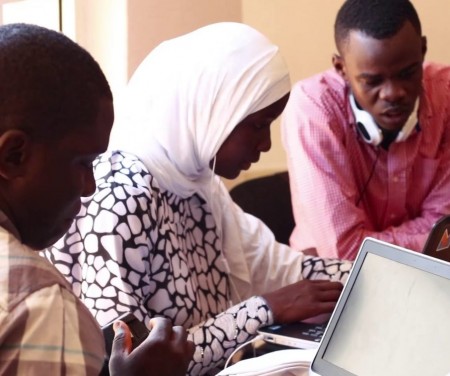CALL FOR PROPOSALS
PROJECT – ‘STARTING A TECH HUB IN THE GAMBIA FOR DIGITAL ENTREPRENEURSHIP’
INTRODUCTION
This document provides a full set of information regarding the first open call for proposals for the project – ‘starting a Tech Hub in The Gambia for digital entrepreneurship’.
BACKGROUND INFORMATION
The number of active tech hubs across Africa is growing steadily, rising from 314 in 2016 to 618 in 2019, with more due to launch. Tech hubs and innovation spaces are at the heart of Africa’s technological and start-up revolution. Tech hubs are designed to support start-ups and help them thrive, as well as build entrepreneurial tech communities. Although hubs can vary widely in terms of structure and services, they are generally viewed as places where tech and entrepreneurship community members assemble.
At its core, a tech hub is a space where technology enthusiasts, innovators and entrepreneurs gather to share ideas and build. For the purposes of this call for proposals, tech hubs are defined as ‘organizations or institutions that support early-stage technology innovators by allowing them to establish links to other members of the innovation ecosystem, with the goal to improve their business performance’. Tech hubs have two primary purposes: to build businesses and to create community.
The Committee on the Establishment of a Tech Hub headed by the Ministry of Trade, Industry, Regional Integration and Employment (MOTIE) in collaboration with the United Nations Development Programme (UNDP) and the International Trade Centre (ITC) through the Youth Empowerment Project (YEP) request for proposals from potential institutions or organisations to create a Tech Hub in The Gambia.
The objective of the call is to establish a Tech Hub in The Gambia, with the purpose of promoting and strengthening the culture of innovation, fostering and nurturing creative entrepreneurs in the digital economy, facilitating the matchmaking of demand and supply for innovative solutions across The Gambia.
The Tech Hub will be a virtual and/or physical facility offering services and programmes open to everybody, with a focus on private sector innovation advice, support and/or financing.
The Tech Hub should have a widespread outreach, beyond the Greater Banjul Area, and be accessible to young innovators from across the country. The Tech Hub will place special emphasis on female innovators and women-led projects.
The Tech Hub will connect young innovators with the private sector in The Gambia, stimulating both demand for and supply of digital innovations.
The Tech Hub will connect innovators with local support organisations, universities and applied research service facilities, financial intermediaries, angel investors and venture capitalists, access to international networks offering partnerships, financial support and expert advice.
The Tech Hub aims at fostering digital entrepreneurship in The Gambia and provide incubation and acceleration support for tech start-up companies. It will serve as a hub for the whole ecosystem by bringing together students, experts, project leaders, entrepreneurs and innovators to foster collaboration, deepen skills and initiate new ventures.
In keeping with the objectives of The Gambia’s National Development Plan (NDP), the initiative is meant to leverage Information and Communication Technologies (ICTs) to boost socio-economic development through innovative digital solutions and to accelerate the creation of quality jobs. As such the Tech Hub is expected to support the ICT sector but also offer catalytic support in other industries such as agriculture, health, education, livestock and the e-government administration. Specifically, the Tech Hub is expected to run the following objectives:
- An incubation and acceleration programme for tech companies; this covers training in business model development, free-office space during the incubation period, access to a conducive workspace environment, tools and other facilities during the incubation period;
- A fab lab and related programmes (e.g. training on 3D printing solutions) which could also include support to robotics, AI integration and prototyping;
- A co-working space including a corner for the freelancers o Basic ICT training and entrepreneurial skills development programmes
Other sectors such as tourism, agriculture, health, education, livestock and the e-Gov administration will also benefit from the digital solutions developed by the beneficiaries
ELIGIBILITY CRITERIA
The Call for Proposals is open to private sector entities, institutions, NGOs and research institutions. Applicants must be legally established in The Gambia. Joint submissions through consortia and partnerships are possible and encouraged.
GENERAL INFORMATION
- Means of Submission: through email to abalagaye@gmail.com.
- Language: English
- Documentation Formats
- Any document requested in any of the phases must be submitted electronically in PDF format without restrictions for printing.
- Number of Proposals per Applicant
- One proposal will be accepted for incubating per company or individual.
- The deadline for submission of proposals is 16th October 2019 at 12:00 pm
- The proposals must adhere to the guidelines provided.
- Evaluators may consider extra material in the evaluation.
- If the applicant discovers an error in the proposal, and provided the call deadline has not passed, the applicant may submit a new version. Only the last version received before the call deadline will be considered in the evaluation.
It is strongly recommended not to wait until the last minute to submit the proposal. Failure of the proposal to arrive in time for any reason, including communication delays, automatically leads to rejection of the submission. The time of receipt of the message as recorded by the submission system will be definitive.
Requests or inquiries about the submission system or the call itself, received AFTER the closure time of the call will neither be considered nor answered
CLICK HERE TO DOWNLOAD ALL THE INFORMATION: GUIDELINES FOR APPLICATION AND EVALUATION CRITERIA
